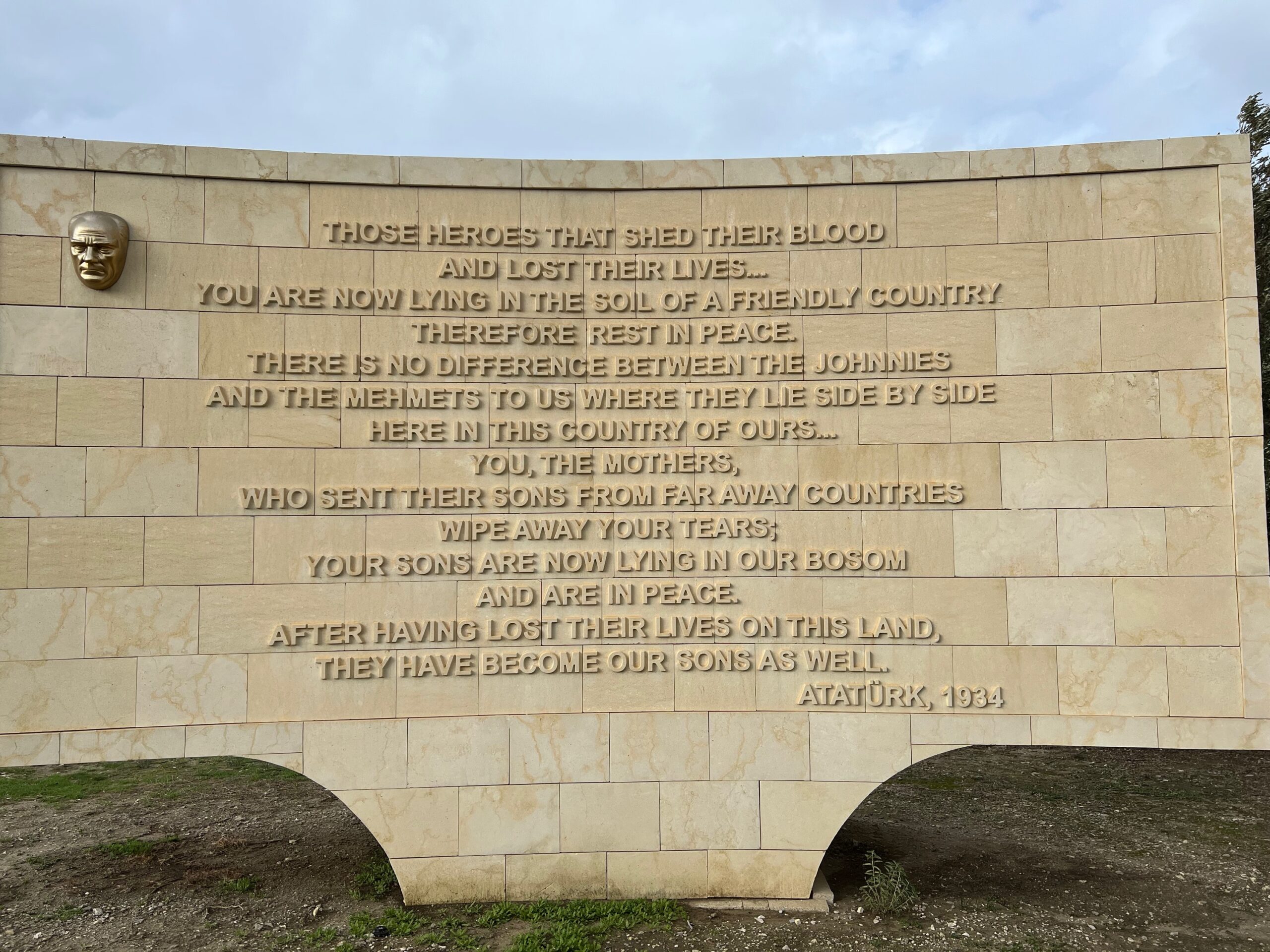
Gallipoli – ANZAC Identity and the Birth of Turkey.
“Off you go to your death…”
-Mustafa Kemal Atatürk (or at least a quote attributed to him)

The World War 1 battle of Gallipoli resonates deeply within three societies. For Australians and New Zealanders, this long, tragic and painful campaign acts as a sort of coming-of-age. For what were two young countries replete with pride of empire and a sense of adventure, this was shocking…
For Turks, this was in some manner the last stand of the centuries-old Ottoman Empire and is now commemorated as the rise of a modern Turkish Republic.
For well over 100,000 people from the Ottoman Empire (Turkey), the British Empire (including Indians and Newfoundlanders), France, Australia and New Zealand, Gallipoli was a horrible place to die. Probably miserably.

Officially the campaign began February 19, 1915 and eventually petered out by January 9, 1916.
Indeed the battle may be seen as an Ottoman victory – but the massive loss of life (and resources) meant a slight delay of the inevitable fall of the sick, old empire.
For those unfamiliar with the term ANZAC –it is the Australia-New Zealand Army Core. These assaults represented the first major participation of ANZACs during the so-called Great War and thousands died. Australia in 1915 was home to nearly 5 million and New Zealand 1.1 million. Combined, 11 025 soldiers were killed and another 22 640 were wounded. On the Gallipoli (Gelibelu) Peninsula, these young Antipodean countries discovered what war really meant.

In actual deaths, the Ottomans defended their land with around 60 000 deaths and another 200 000 injured or captured.
British Empire deaths were over 30 000 people with another 170 000 wounded, ill or unaccounted (I wonder how all those Indian families feel about their young men dying for the Empire…).
France lost 9000 with another 40 000 wounded.
All of this carnage represents one of many horrific campaigns that define not only the First World War, but most conflicts through the 19th and 20th centuries.
I am not a particular fan of Charles de Gaulle, but he did offer one meaningful quote;
“the graveyards are full of indispensable men.”
For the allied forces, Gallipoli has come to represent poor planning, arrogance of the aristocratic elite and an utter disregard for soldiers’ lives. The Ottoman Empire was considered the ‘sick man of Europe’ by this time, but its population and ability to fight was grossly under appreciated.
After a series of wars with the Balkan States and pressures from most sides, this was the first time Ottomans were fighting to defend their land from the west (in the east of the empire, atrocities particularly towards the Arminians had occurred for decades).
The plan to open the Dardanelles Straights was concocted by Winston Churchill and was presumed to be a straightforward attack. He surmised old, decommissioned ships would suffice. Several were sunk by mines the first day.
Soon the fleet was forced to divert and the allied forces were exposed from the low ground. Australian regiments took on particularly high losses as their forces were used as a diversion for the main attack.

One may analyze strategy from many perspectives, but I find it more moving to step back and mourn the utter pointless carnage of the entire event.
From an allied point of view, Gallipoli was a disaster.
For the Ottomans, this battle marked the rise of Mustafa Kemel who would eventually form the secular Turkish Republic in 1923.
Once the allied leaders finally came to terms with their poor planning and inability to hold higher ground, a gradual retreat ensued. It is worth noting the Ottomans held their ground, but chose not to slaughter troops as they limped away. This too may be part of the friendship that has developed between ANZAC’s and Turks over the following decades.

This particular action concluded nothing, but the war continued on all fronts. Britain and France planned to carve up the Ottoman Empire – advocating for a Jewish State, a Kurdish homeland and a united Balkan State – Yugoslavia.
Russia descended into a revolution and yet another civil war.
Turkey emerged after years more conflict and bankrupted Germany embraced an extremism that led to genocide and another 100 million deaths.
One learns that World War 1 was a failure of bilateral treaties. This may be somewhat true, but the story is much deeper. All of this suffering and killing represents the fusion of technology mixed with old-style war and an utter disregard for the lives of normal people.
World War 1 is also all about the rise of nationalism – a story still playing out in Balkans.
The war was also about protectionism. Closed Empire that believed economics were a zero-sum game, with a finite amount of resources to go around.

Mr. Crawford was among the older soldiers in this cemetery. I wonder when he was dying, whether he was comforted by God, King and Country.
Sadly, I think more of Bob Dylan’s song;
Only a Pawn in Their Game
#peaceandlove
